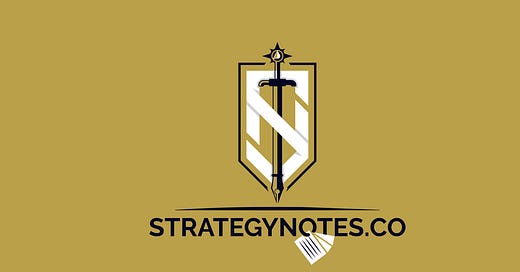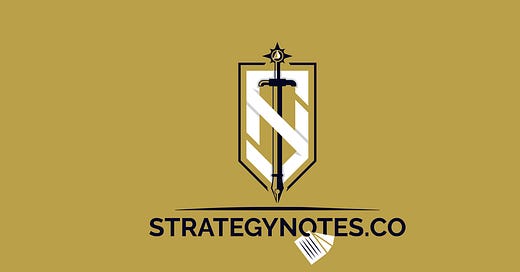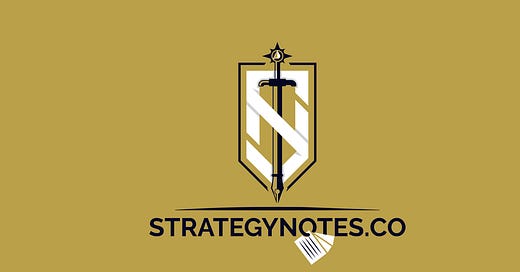
I heard an old story once, possibly of Eastern European provenance, that applies to today’s subject.
The King announced he would take his twin sons hunting to determine which would rule next.
Prince Patrick prepared diligently, stuffing trunks with game maps, thinking through each step in approaching individual types of prey, visualizing every detail until he was ready to show his father who should rule the realm by demonstrating his hunting superiority. He planned and recited a speech to follow a great kill that would clinch his kingdom.
Prince Samuel—busy with his own neverending series of experiments, interests, and curiosities—threw a compass and some books in his bag on the way out the door.
When the hunting party neared the realm’s edge, the King dismounted his horse and turned. With his heels on the border, he said, “We are not here to hunt. We have come to consider war with our neighbors. It is a decision I take seriously. Whichever of you provides me the best counsel on this scouting trip will rule after me.”
**
Not long ago I came across a disagreement online about the difference between “strategy” and “strategies” and “plans.” Busy with work, I only had a moment to interject a short note into the discussion:
“Plans end (i.e., planning a trip when all the variables are known). Some strategies end, if they’re aimed at a specific objective (i.e., competitive sports). Some strategies won't end as the objective sought extends farther than the foreseeable horizon.”
I never got a chance to finish the discussion but the topic is so important I can’t let it go. So let’s start with a premise. A simple one. That all three (plans, strategies, and strategy) are processes we use to succeed in some endeavor. They do have some common features. But they also differ in important ways.
Think of three typical running goals on a marathon course. Some plan to finish a marathon. Some have a strategy to defeat another competitor. And some have a longer horizon strategy, say, to be a world-class athlete or a healthier human being.
To finish a race or hit a time, one simply must make a plan to get from Point A to Point B. The goal is objective; there is a defined “end state” (arriving at the finish line, or, arriving at the finish line by some specified time). This can be planned out.
Then there’s defeating an opponent. This is a subjective goal because the competitor is a living adversary. You may expect her to zag; instead, she zigs. The subjective nature of this competition means you’ll be subject to slightly greater scrutiny. If there are one-on-one stakes, your competitor will put every action on the microscope and if there’s any funny business will be quick to put that out to the world via megaphone (in this case, tell a race official if you’ve cut corners). There will be a certain end to the competition, and that end drives a declaration: success/non-success/unsuccessful.
The last is the longest-horizon strategy, with no discernible end in sight. Those are the folks that have higher aims. The person who seeks to use the race in some meaningful way to become healthier. The person who seeks to use the race in some meaningful way to attain world-class athlete status. The person who seeks to use the race in some meaningful way to nudge forward fundraising toward a cure for cancer. The race is part of their strategy but won’t end at the finish line.
One note of distinction. I like to term them “strategy” versus “strategies” to differentiate longer-term strategy from individual strategies with end states. I do that because it helps to keep them straight in my head, and for the simple reason that true long-haul “strategy” are far fewer in number compared with the many more “strategies” in existence. (Some prefer to call this “grand strategy” versus “strategy,” I suppose.)
There isn’t always a hard-and-fast distinction among these three. However, answering a few questions can help bin them.
Is there a competitor? (If no, then it’s most likely a plan. There’s some gray space here with some particularly nasty environments that can act as a non-human “enemy.”)
Is the goal an objective or subjective target? (If objective, then plan. If subjective, then strategies or strategy.)
Does the goal end within the foreseeable future? (If yes, then strategies. If no, then strategy.)
As we progress from plans to strategies to strategy, we move from more concrete/defined/certain/stable terms to more fluid/ambiguous/uncertain/dynamic terms. That’s natural. When it’s a plan, we can go from known step to known step, and see the moves along the way (think how well marathon race courses are mapped and certified, down to a fraction of a mile).
Sure, with strategies, we know there’ll be some end (maybe not when, but it’s out there). But beyond that there are so many factors beyond our control. I’ll never forget the day I raced a half-marathon in Tampa Bay a little over a decade ago. We started in the early morning, and I went out with two of the race’s top runners. We followed the race director’s vehicle, who guided us through lefts and rights in the dark to start the event. But we runners’ got so locked-on the vehicle that we missed a huge flashing orange sign beckoning us to turn. We followed the vehicle instead. What we didn’t realize was that the vehicle presumed we saw the enormous orange arrow and we were just thinking about our competitors. So in the momentary head-down stupidity of the race, we made a wrong turn that cost us at least two or three minutes, which is more than enough time to lose a competitive half-marathon.
Plans don’t have as many variables. They don’t force as many errors. That’s not so say you shouldn’t plan out tough events….but strategies force you to encounter more variables where you’ll take on more Known Unknowns and Unknown Unknowns.
When it comes to strategy, the variables often multiply the farther out from now you go. When your aim is to cure cancer or be a world-class athlete or healthier human, sure, you can apply metrics along the way as interim markers (plans and strategies that serve strategy), but those are long-haul objectives you’re not likely to cross off the list for quite some time. You’ll meet monsters you never considered along the way.
**
Like poor Prince Patrick. He planned for one competition only to have the game changed. Prince Samuel’s wide interests, curious nature, and natural flexibility tipped the scales away from his over-prepared brother and toward him.
Or did it?
I’m not sure. The way I’ve been told, the tale ends there, lost to time. Maybe it’s better that way, without one or the other to have claimed the throne. Maybe Patrick adapted on the fly and used his knowledge of terrain. Maybe Samuel was well versed in diplomacy and strategy, but lacked an on-the-ground perspective.
What seems to matter most is to spot the advantages and disadvantages in preparedness and adaptability, rigidity and fluidity. And use them according to our own needs, as appropriate. Plans and strategies and strategy are simply different tools we use for different jobs we need to get done. Picking the right one is job one.
*Afterthought: “I like things to happen; and if they don’t happen, I like to make them happen.” (Winston Churchill)
*Editor’s Note: What do you think? Really, what do you think? Please let me know with a comment, and, if you enjoyed this, forward it on to anyone you think might benefit or find it of interest. Your word-of-mouth mention to another person means everything to this community’s continued growth.
All the very best & see you next week, Matt













